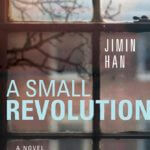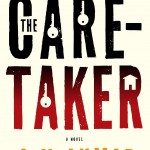17 May / 14 #OwnVoices Mysteries for Asian Pacific American Heritage Month [in The Booklist Reader]

 Ready for some double duty? As you may know, May is Asian Pacific American Heritage Month (woo-hoo! happy me!). Additionally, May is also #MysteryMonth at Booklist. To celebrate, here’s a list that hasn’t been done before on The Booklist Reader: mysteries and thrillers by #OwnVoices APA writers.
Ready for some double duty? As you may know, May is Asian Pacific American Heritage Month (woo-hoo! happy me!). Additionally, May is also #MysteryMonth at Booklist. To celebrate, here’s a list that hasn’t been done before on The Booklist Reader: mysteries and thrillers by #OwnVoices APA writers.
I know, such a high body count gathered on a single page may feel daunting, but you can check off two boxes on your TBR list with any one of these chilling titles.
 The Art of Confidence by Wendy Lee
The Art of Confidence by Wendy Lee
An unknown, 30-year-sojourning Chinese artist is paid a pittance to recreate a missing canvas. A desperate New York gallery owner sells it for millions to hold onto a dead woman’s legacy. A young assistant with her own creative dreams wrestles over the cost of integrity. A wealthy Taiwanese investor loses almost everything, except, perhaps, what’s left of his soul. At the very end, a dead man offers the only glimpse of what really happened, which only the privileged reader can ever know. Revealed through viewpoints that shift between chapters, this is a sublime examination of what defines art, what gives art value, and the prices, far beyond the monetary, that we’re willing to pay to view it, admire it, acquire it, and even let it go.
 Blood Hina by Naomi Hirahara
Blood Hina by Naomi Hirahara
Mas Arai, a schlumpy, grumpy Japanese American gardener, has seven titles to his name, and Blood Hina falls smack in the middle of Edgar Award-winning author Hirahara’s mystery series. Here, Mas begrudgingly agrees to play best man at his best friend Haruo’s second wedding. But when the shindig is suddenly called off the night before – and Haruo is accused of stealing his fiancée’s family’s valuable traditional Japanese dolls (the hina on that blood-splattered cover!) – Mas can’t just stand by eating ramen while Haruo suffers. Mas knows Haruo is innocent (their pasts intertwine all the way back to Hiroshima, after all), but he can’t be sure about anyone else. He’s not only got thieves, murderers, gamblers, addicts to deal with, but this time, he’s up against some pretty powerful ghosts, as well!
Forced to flee his home country after a tragic military disaster, former Sikh Indian Army Captain Ranjit Singh eventually lands in posh Martha’s Vineyard, hoping to ride out the off-season with multiple caretaking jobs for owners of empty luxury homes. Unable to afford to keep his family even in a disintegrating rental, he risks temporarily and secretly relocating them to the waterfront estate of a Massachusetts senator. The family’s plush arrangement is interrupted when two men enter overnight, setting in motion a chain of runaway events that includes betrayal, deportation, and murder. Guided by the ghost of a fellow Indian officer and assisted by a terminally ill American veteran, Ranjit also depends on an antique doll, a computer-savvy relative, and an override alarm code to survive. Caretaker is the first in a trilogy starring the intrepid Captain Ranjit Singh, followed by The Last Taxi Ride. The final installment remains impatiently anticipated.
 Dragonfish, by Vu Tran
Dragonfish, by Vu Tran
In Tran’s memorable debut, six characters navigate through various gray areas. Each is linked together by one woman: a Vietnamese refugee, who, almost two decades after arriving in the U.S., still hasn’t found firm ground. Her unsolved disappearance engenders tenuous connections between the protagonist, a white Oakland cop who was once the woman’s husband; her current husband, a gambler; his protégé son; one of their henchmen; her former best friend; and the intended recipient of letters she writes longingly throughout the novel. From Oakland to Las Vegas, from Vietnam to Malaysia, Tran creates a world of contrasts and challenges, of rebirths and loss, of resonance and disconnections.
 Haunting Bombay by Shilpa Agarwal
Haunting Bombay by Shilpa Agarwal
Pinky Mittal, a 13-year-old schoolgirl in 1960s Bombay, lives with her extended family in a sprawling bungalow in one of the city’s more fashionable neighborhoods. Her grandmother, who rescued her as a toddler after her mother’s death, dotes on her. Her aunt-by-marriage barely puts up with her. Her oldest cousin, in love with Lovely next door, barely notices her (although Pinky finds herself suddenly swooning over him). Late one night, Pinky does the forbidden and opens a creaky bolted door … and unleashes the vengeful spirit of a murder victim. Secrets emerge, lies are told, truth is repeatedly obscured, and no one in the family is safe from harm.
 Little Fires Everywhere by Celeste Ng
Little Fires Everywhere by Celeste Ng
The morning after Mia Warren and her daughter, Pearl, return the Richardsons’ rental key to their mailbox, the youngest Richardson, Izzy, sets “little fires everywhere,” destroying the family home. How such a desperate act could happen in pristine Shaker Heights, Ohio, is the focus of Ng’s (Everything I Never Told You) stupendous sophomore title. After providing the Warrens with a rental apartment, the wealthy Richardsons quickly integrate Mia and Pearl into their sprawling lives. That is, until a close friend of Elena Richardson adopts an abandoned Chinese baby and the birth mother returns, causing a rift in the community over who deserves custody, and Elena and Mia find themselves on polarizing sides of the issue. “Everything … beautiful and perfect on the outside,” crumbles, observes Izzy, the family’s barometer of truth, about identity, parent-child bonds, and most of all, love.
 A Map of Betrayal by Ha Jin
A Map of Betrayal by Ha Jin
CIA agent Gary Shang was convicted of spying for China, yet called himself “a patriot of both the United States and China.” Decades after Gary’s death, Lilian, his only child with his American wife, unexpectedly inherits Gary’s diary from his longtime mistress – and discovers it holds 30 years’ worth of writing about his conflicted existence. When a Fulbright lectureship gives Lilian, now a middle-aged professor, the opportunity to teach a semester in China, she finds her father’s first family he was forced to abandon. Presenting dovetailing narratives that feature Gary’s career from 1949 to 1979, and Lilian’s contemporary search and subsequent revelations, Jin deftly plots a family history caught between uncompromising attachments and inevitable betrayals. Spy story it may be, but what lingers is the immeasurable human toll.
 Miracle Creek by Angie Kim
Miracle Creek by Angie Kim
For those looking for alternate therapies, the Miracle Submarine in Miracle Creek, Virginia, provides HBOT (hyperbaric oxygen therapy), believed to treat such conditions as autism and infertility. Despite the “miracle” claims, this health venture is anything but: a mysterious explosion aboard the Miracle Submarine kills two patients and seriously injures others. Elizabeth Ward’s son, Henry, is among the dead. Elizabeth, painted as a desperate mother who snapped while raising a special-needs child, stands trial for murder. What might seem initially obvious will, of course, prove otherwise, as victims, perpetrators, and liars peel away the layers of howdunit, whydunit, and finally, whodunit.
College professor Kyung Cho and his wife discover Kyung’s mother wandering disoriented and naked beyond their backyard. Kyung concludes she’s been battered by his father again. But when he seeks answers in his parents’ impeccable manse on the hill, he’s shattered to find his parents and their housekeeper the victims of a heinous crime. As the extended Korean Irish American family attempts to reclaim their fractured lives, Kyung’s decades-long, suppressed rage at his abusive father and submissive mother threatens to destroy any semblance of resolution and recovery.
 A Small Revolution by Jimin Han
A Small Revolution by Jimin Han
In a Pennsylvania college dorm, five teens are trapped in a life-and-death situation. The quintet’s point of connection, allegedly dead, is a Korean American student named Jaesung, who was reported to have perished in a recent car fire in Seoul. Yoona, in whose room the terror plays out, was Jaesung’s lover. Her three classmates become bargaining chips. Lloyd, armed with deadly weapons, claims both Jaesung and Yoona as intimate friends. Convinced that Jaesung is the victim of a cover-up by a violent, corrupt regime controlling South Korea, Lloyd is determined to rescue Jaesung by any means necessary. Although marked by events three decades past, Revolution is a resonant parable for today’s volatile, fearful times.
Lin has two mystery series: Robert Chow and Taipei Night Market with three installments each. If I had to choose one (but why?), I admit I’m slightly partial to tough-guy-on-the-outside, caring-citizen-on-the-inside Robert Chow. The token Chinese American cop in 1976 New York, Chow has finally moved from Chinatown ribbon-cutting ceremony attendee to full-time detective. A Vietnam War vet, Chow is still, however, fighting his personal demons: memories of death and destruction. He shares this past – not to mention his not-so-long-ago alcoholic binges – with his NYPD partner, Vandyne. When two corpses turn up under the Brooklyn Bridge, Chow’s investigation leads him to chasing down “snakeheads,” smugglers who traffic in human flesh.
 Sorry to Disrupt the Peace by Patty Yumi Cottrell
Sorry to Disrupt the Peace by Patty Yumi Cottrell
When Helen receives a call from her “Uncle Geoff” (although she’s unsure how they’re related), she learns her 29-year-old adoptive brother has died by suicide. Both Helen and her brother were adopted as babies from Korea by a white (some might add, willfully culturally illiterate) Milwaukee couple. At 32, Helen is a disgraced former artist working with troubled youth. Determined to understand why her undemanding, quiet brother chose death, she buys a one-way ticket from New York City to their adoptive parents’ home, where she’s now less than welcome. Helen’s no-filter descriptions of her perplexing life morph into an inventive, disturbing, and noir-ish tragicomic debut.
 Water Ghosts by Shawna Yang Ryan
Water Ghosts by Shawna Yang Ryan
Locke, a historical Chinatown, was founded in 1915 when Chinese immigrants living in nearby Walnut Grove escaped a devastating fire and decided to build a community of their own. Now it’s 1928, and in the midst of the annual Dragon Boat Festival, an unfamiliar boat carrying three Chinese women emerges from the center of a black fog. The mysterious trio’s arrival rattles the small town’s already delicate balance. In Ryan’s eerily effective ghost story, originally published with the title Locke 1928, the spirit world is never far, and characters live just on the edge of reality, driven by fortune-tellers’ revelations and the blood and tears of tragic lovers.
 The Widows of Malabar Hill by Sujata Massey
The Widows of Malabar Hill by Sujata Massey
Massey, creator of the popular Rei Shimura mysteries, debuts her 1920s Bombay series, starring feisty Perveen Mistry, India’s first female solicitor in 1921. The narrative dovetails Perveen’s challenging career journey, from enduring aggressive sexism in Bombay’s Government Law School to Oxford University, with her first active client case. While assisting her esteemed solicitor father, Perveen is granted face-to-face access with the three widows of a recently deceased Muslim merchant. The women, who live in purdah (seclusion) – and are controlled by their late husband’s appointed guardian, Faisal Mukri – are prohibited from talking to men. When Perveen finds Mukri dead, solving his murder will require carefully navigating rigid gender roles, confronting local and imperial British police – and even surviving a violent kidnapping.



